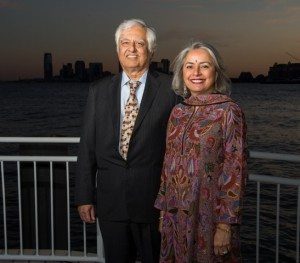Kavita, Lalit Bahl’s generosity will help build laboratory at Stony Brook.
By The American Bazaar Staff
NEW YORK: The State University of New York’s (SUNY) Stony Brook will establish the Bahl Molecular Imaging Laboratory at Stony Brook Medicine, made possible by an enormous $3.5 million endowment given by Kavita and Lalit Bahl of Stony Brook, New York.

Lalit Bahl is an employee of Renaissance Technologies, a company that specializes in creating medical imaging technology. The donation that he and his wife have made matches that of Renaissance Technologies Jim Simons.
“Stony Brook has been a notable leader in both discovering and using breakthrough imaging technology for research and clinical purposes,” said Lalit Bahl, in a statement. “Kavita and I are certain that the cyclotron and molecular imaging offer the promise of important discoveries related to cancer and other diseases.”
Stony Brook University president Samuel L. Stanley, Jr., M.D. expressed his gratitude for the incredible contribution made by the Bahls.
“We are extremely grateful for the generosity of Kavita and Lalit Bahl, and their visionary contribution to Stony Brook’s medical imaging program,” Stanley. “The Bahl Molecular Imaging Laboratory and the new Cyclotron will enhance real time diagnostic capabilities and at the same time will provide the resources our faculty and students need to advance cancer research and treatment to a higher level.”
The new Bahl Molecular Imaging Laboratory is part of a larger $423 million expansion plan that Stony Brook Medicine has undertaken entitled MART, which is an eight-floor, 245,000 square-foot complex currently under construction.
The Bahl Laboratory will “enable Stony Brook physicians and researchers to diagnose and monitor disease at the molecular level, as well develop new, targeted treatments for cancer, neurological disorders, and other diseases. Plans for the laboratory include a cyclotron, a particle accelerator that is used in medicine to create radioactive tracer molecules to enhance diagnostic capabilities or treat specific diseases, particularly cancer,” the school said in a press release.
“This gift will make a huge impact on our medical imaging program, clinical capabilities and new Department of Biomedical Informatics,” said Kenneth Kaushansky, MD, Senior Vice President of the Health Sciences and Dean of the School of Medicine. “Our use of cutting-edge molecular imaging in conjunction with computer technology to analyze biological data will be a catalyst toward increasing our abilities to understand disease processes, make earlier diagnoses, and better treat patients.”
The school has not announced when it expects the expansion plan and new Bahl Laboratory to be open and operational.


